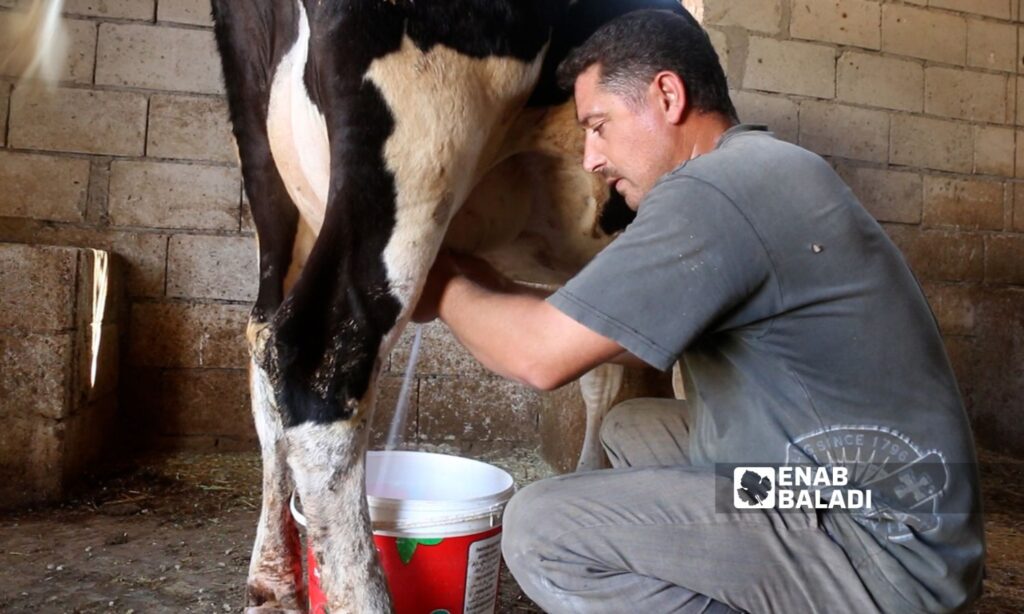Idlib – Anas al-Khouli
Livestock breeders in Idlib governorate, northwestern Syria, face many problems in the cows’ artificial insemination since natural insemination is expensive, while artificial insemination may not succeed, which demands to repeat it.
Under the current circumstances, breeders rely more on the natural insemination of cows due to several failed artificial insemination operations, in addition to its high costs, especially after the cessation of a number of relief organization projects that used to sponsor part of the costs of artificial insemination operations.
Natural insemination affects the health of bulls due to its scarcity in the region, which makes breeders depend on one bull to inseminate a large number of cows, a process that negatively affects the bull’s health and may lead to a decrease in its weight.
Natural insemination has its difficulties
Forty-year-old Abdul-Qader al-Ali, a cow breeder residing in the city of Idlib, told Enab Baladi that raising bulls is extremely difficult, as they must be isolated from the females, especially during the pregnancy stage, so that the bull does not harm the cow end the pregnancy, or break the fence or barn, which makes allocating a place for the bulls expensive.
The difficulties of raising bulls make cow breeders prefer artificial insemination to improve the quality of cows, but the repeated failure of artificial insemination operations has reinforced their belief in the incompetence of veterinarians to perform such operations or the lack of quality of the samples used in the insemination process.
Al-Ali relies on a single bull to inseminate his cows and the cows of other breeders in the region who do not have male cattle, even though this misses the opportunity to improve the breed and threatens the emergence of diseases on the cows, especially reproductive ones, in addition to the material losses that the breeder may be exposed to, such as the bull losing weight.
According to al-Ali, the bull can perform the insemination process once every three days, and using medications can make it perform the insemination process once every two days.
The process of insemination must be accompanied by high nutrition for the bull, yet it loses a lot of weight, which means a lot of feed consumption and selling the animal at a lower price than normal due to its lean weight.
Al-Ali pointed out that some breeders prepare fodder for his bull if it inseminates one of their cows as a form of solidarity, but that does not prevent the breeder from losing.
Natural and artificial insemination exhausts cow breeders in Idlib – June 26, 2022 (Enab Baladi/Iyad Abdul Jawad)
Artificial insemination has more features
Artificial insemination is one of the scientific methods used to improve livestock and produce new generations with better genetic characteristics than the previous ones, which reflects positively and leads to higher production of meat and dairy, so many countries follow it to improve their food production, according to what artificial insemination specialist Jamal Manna said to Enab Baladi.
For his part, the veterinarian, Mahmoud Bahlaq, said that the artificial insemination technique helped greatly in improving livestock and enabled breeders to obtain improved bulls that are not usually available due to their high price or unavailability in the region.
The importance of artificial insemination increases with the results it has achieved, including genetic improvement in the herds and a very rapid increase in productivity levels.
This leads to higher milk production, dependence on fewer cows, less burden of feed consumption, and development in health care for cows, according to the veterinarian.
Bahalq pointed out that artificial insemination, despite its importance in improving births, remains subject to special conditions in the environment, production systems, and the human element in order for its success and spread to be complete.
Factors affect artificial insemination success, including food
A number of veterinarians attributed the failure of artificial insemination operations to the breeders’ lack of care for the inseminating animals, the lack of regular visits to the veterinarian, and the poor nutrition of the animals.
The veterinarian, Bahalq, believes that the expertise and competencies available in Idlib are high in the field of artificial insemination, explaining that the process of insemination is linked to many factors, the absence of one of which leads to the failure of the insemination process.
According to the veterinarian, the artificial insemination process requires careful follow-up and is closely linked to the quality of the animal’s housing place and the quality of the nutrition and fodder available.
He also pointed out that the deteriorating financial condition of breeders prevents them from securing the necessary fodder supplements, which negatively affects the degree of fertilization of animals.
Concerning the types of insemination tools available in northern Syria, Bahlaq explained that two types of artificial insemination straws (syringes) are imported, namely Friesian-Holstein and Sementa, from Turkey, with no significant differences between the two types.
The process of preserving “semen” is carried out through the use of nitrogen, and during the insemination process, oxygen or liquid nitrogen is also used, stressing that the process of mixing, preserving, or cooling the “semen” is an important factor in the success of the fertilization process.
The cost of artificial insemination is about 250 Turkish liras, and it increases with the distance that the veterinarian must travel to carry out the operation. Bahlaq pointed out that the increase in fuel prices led to an increase in costs.

